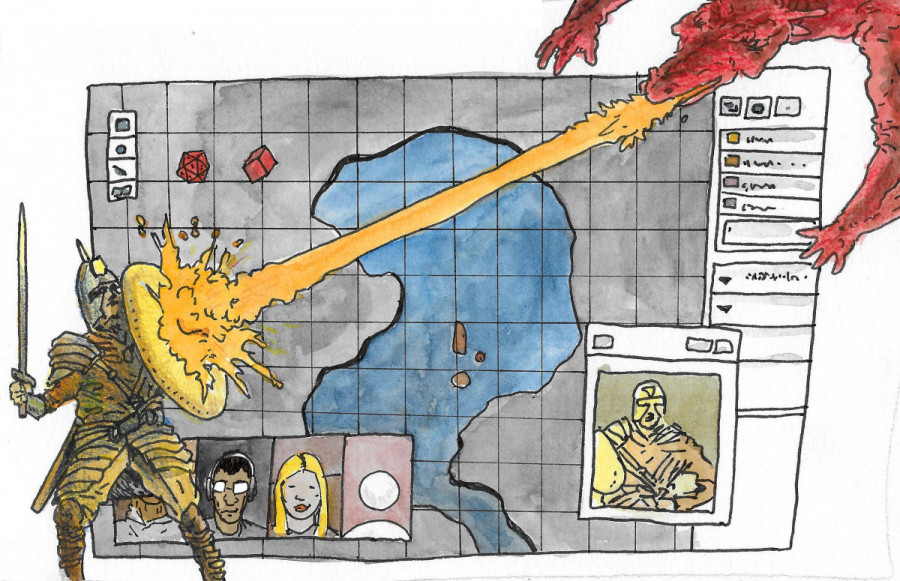Adventures in Cyberspace: Montreal’s D&D Community Goes Online
Role-Playing Games Offer Space for Social Connection, Escape During Isolation
Like a lot of people, Kate Ruscito had preconceived notions about Dungeons and Dragons. “Even when I first started playing, I didn’t want to play,” she said. “I was like, ‘That’s for complete losers.’”
Eventually, as friends wore her down, she agreed to give it a shot. “The first time I sat down with a character I made and I rolled dice, my brain clicked. I was like, ‘Oh no—I love this.’”
Today, Ruscito, 33, is a cofounder of D&D Montreal, a local nonprofit dedicated to raising money for charities and other community groups through gaming events. It organizes local play under the international D&D Adventurers League, which is sanctioned by the game’s publisher, Wizards of the Coast.
Until recently, in corners and back rooms of gaming stores across the city, scores of Montrealers could be found immersed in fantasy, tuning out the din of nearby tables to focus on the adventures at hand—experiences curated by game leaders known as dungeon masters, or DMs.
Now these stores sit empty in a world transformed by a pandemic that has touched nearly all aspects of life.
According to Ruscito, Montreal is home to one of the largest Dungeons and Dragons communities in North America, something she credits to the creativity of local residents. “When you’re able to kind of funnel that with other people who are into the exact same thing as you, it creates this insane environment because you’ll meet somebody who has this bananas concept, and then you feel challenged to kind of match that energy,” she said.
Dungeons and Dragons is not like the linear board games with which many are more familiar. Play can range from single sessions—or adventures—to long, complex campaigns lasting months. Characters have distinct attributes alongside player-created backstories. Dice are used not to move spaces but to determine the consequences of a range of actions as limitless as a player’s imagination, all moderated by the DM.
An official document titled “D&D Basic Rules” is 180 pages long—but the immersion the game demands helps create a supportive culture among its players.
“The game is amazing, but the people are just some of the best people I’ve ever met in my life,” said Ruscito.
Online platforms such as Roll20 and Fantasy Grounds cater to players of Dungeons and Dragons and other tabletop role-playing games, untethering a fantasy experience even further from the hindrances of real life. The platforms even include features such as music, sound effects, tokens, terrain, and lighting effects.
Holdouts have become late adopters as social distancing requirements have forced them to move online to get their role-playing fix.
According to Amber Cook, director of business development for Roll20, the company noticed a surge in European traffic weeks ago and has more recently seen the same thing happen in North America as COVID-19 has exploded here.
“Roll20 is a way for people to connect socially,” Cook said. “People are being creative about how to connect during quarantine—group storytelling, workouts, video games, Zoom for family dinners.”
She said Roll20 has been helping people connect for years. “There are just more people who need that connection right now as they try to stay safe.”
For her part, Ruscito has worked playing online into her daily routine, which still includes her job as a social media strategist with the National Film Board. On a typical day, she works nine-to-five, eats dinner, and starts playing Dungeons and Dragons online around 7 p.m.
Ruscito, who played every day even before the current crisis, believes Dungeons and Dragons has a lot to offer people who are struggling with social isolation.
“D&D has always been a really great outlet to give yourself something to focus on and just kind of lose yourself in,” she said. “Now that the real world is so eminently bad, that escapism is super, super needed.”
“Now that the real world is so eminently bad, that escapism is super, super needed.” —Kate Ruscito
Still, she said playing online could never completely replace an in-person experience. She misses playing at game stores or at somebody’s house, ordering pizza and drinks.
For all the features available online, it’s hard to beat the creativity possible when face-to-face, said Ruscito. “We have DMs who construct set pieces to bring to tables,” she said. These have included props as elaborate as to-scale models of rooms. One DM brought in sand because the table’s characters were said to be fighting in a sandy area.
She recalls one game on a Wednesday night at L’Expédition, a game store on St. Hubert St. The store was bustling with tables playing Dungeons and Dragons and Magic: The Gathering, a card-based game.
The session was so engaging, however, Ruscito said it felt like theirs was the only table in the room. The DM had built set pieces and hand-painted monsters, and he was doing voices and had curated a playlist.
“The concept essentially was we were a travelling band who get roped into this kind of encounter, so all of us had our own styles of music,” said Ruscito.
Her character was named Peggy Linda Sammy Johnson—or something like that. “She was this wild dancer character who would breakdance fight you, but because she was like a 1920s character, it was more like the Charleston,” she laughed.
In more typical scenarios, Ruscito gravitates toward barbarians, monks, and bards. “Bards are very musically, technically oriented, very talkative, very charming, very persuasive characters who kind of just set pace with a lot of role-play,” she said.
Jacob Rodrigo, 14, is playing his first online campaign, based on a published adventure called The Temple of Elemental Evil.
“There’s a village that we have to protect, and we don’t really know what’s endangering them,” he said. “So we have to go discover what’s going on in the village, and there’s rumours about evil people, and there’s bandits and goblins and stuff, so it’s a fantasy sort of. It feels like a medieval fantasy sort of thing.”
In the past he has played as a wizard, but he wanted to try something different, so he chose a bard. “I play bagpipes because I saw it in the options, and I was like, ‘I want to go with that,’” he said.
One of the other players stole a squirrel out of a tree, and it now follows her around.
Has the squirrel caused any trouble? “Not yet,” Rodrigo said.
He plays for one to two hours every Tuesday on Roll20. The platform is open to anyone in the world, but he still plays with people from the local community, although he doesn’t know them all in real life.
“I recognize a lot of the names,” said Heather Barton, his mother. She said the fact he’s playing with local people helps put her at ease. “I don’t think I would have just let him sign up randomly online with strangers.”
Like other parents across the city, she is anxious to ensure her children are able to take part in positive activities while in social isolation. “It’s for their morale and the mental stress of just being stuck in the house with their parents all day long and missing their friends,” she said.
She believes the game also has an educational benefit. “It’s the perfect learning situation,” she said, pointing to its strategic and mathematical elements. “It’s better than sitting there and learning times tables. It’s sort of a practical application.”
Her son, however, doesn’t exactly see it this way. “It’s just a fun way to hang out with friends and make new friends,” he said.
Ruscito agrees. “The friendships you make out of this are even more important than the game itself,” she said. “I cannot stress enough how incredible the people are in the community.”





_600_375_90_s_c1.jpg)
